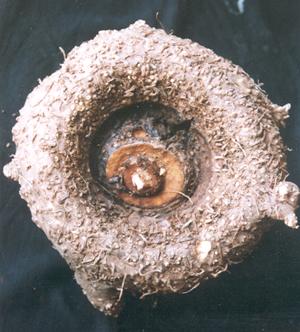|

About the Crop
Amorphophallus(Amorphophallus paeoniifolius) requires fairly long growing
season and a rainfall of about 150 cm during the crop period. A well-drained soil
of medium texture is suited for this crop.
Season
Corm pieces are normally planted during February-March, before the onset of monsoon.
Variety
Sree Padma: The crop matures
in 8-9 months. Cooked tubers are free from acridity.
Sree Athira: First genetically
improved variety with very good cooking quality.
Preparation of land
Dig pits of 60 x 60 x 45 cm size 90 cm apart. Collect the topsoil to a depth of
15-20 cm separately and fill it after the pits are formed. Apply cowdung or compost
at 2-2.5 kg/pit and mix with topsoil.
Seeds and sowing
Tuber cut-pieces weighing about 1 kg are ideal for planting. Dip the pieces in cowdung
slurry and allow to dry under shade before planting. After planting, cover the pit
with dried leaves or other mulching materials. About 12,000 cut pieces weighing
about 12 t are required for planting one hectare. Most of the seed material will
germinate within one month after planting. Mealy bugs usually attack the corm in
field and store. Avoid planting corms already infested.
Minisett planting
Planting of minisett transplant and cormels gives better yield than traditional
method. Cormels weighing 75-100 g each can be planted directly in nursery beds or in the mainfield with the central bud portion
facing up at a spacing of 60 cm x 45 cm. multiplication ratio in
elephant foot yam could be enhanced to 1:15 as against the
convention 1:3 by adopting minisett technique.
Aftercultivation
Apply full dose of P2O5 and half the dose N and K2O
(N:P2O5:K2O @ 50:50:75 kg/ha) after forty five
days of planting along with intercultivation and weeding. Apply second dose of fertilizers
(N and K2O @ 50:75 kg/ha) one month after the first application along
with intercultivation and earthing up.
Harvesting
The crop will be ready for harvest 8-9 months after planting.
Organic farming technology
for elephant foot yam
Recommendation
- Raising green manure cowpea (seed rate @ 20 kg/ha) prior
to elephant foot yam and incorporation of green matter at 45-60 days.
-
Use of organically produced planting materials.
-
Treatment of corm pieces of 500-750 g with slurry containing cowdung, neem cake
and Trichoderma harzianum (5 g/ kg seed) and drying under shade before
planting.
- Application of Trichoderma harzianum
incorporated FYM @ 36 t/ha (3 kg/pit) in pits at the time of planting (FYM neem
cake mixture (10:1) inoculated with Trichoderma harzianum @ 2.5 kg/tonne
of FYM neem cake mixture. Trichoderma can be multiplied in FYM alone but it will
take 15 days to form sufficient inoculam as against 7-8 days if neem cake is also
used along with FYM). This is effective against collar rot caused by Sclerotium
rolfsii.
- Application of neem cake @ l.0 t/ha
(80-85 g/pit) in pits at the time of planting.
- Inter-sowing
of green manure cowpea (seed rate @ 20 kg/ha ) between elephant foot yam pits and
incorporation of green matter in pits a i 45-60 days. The green matter addition
from the 2 green manure crops should be 20-25 t/ha.
-
Application of ash @ 3 t/ha (250 g/pit) at the time of incorporation of green maure
in pits.
Top
|